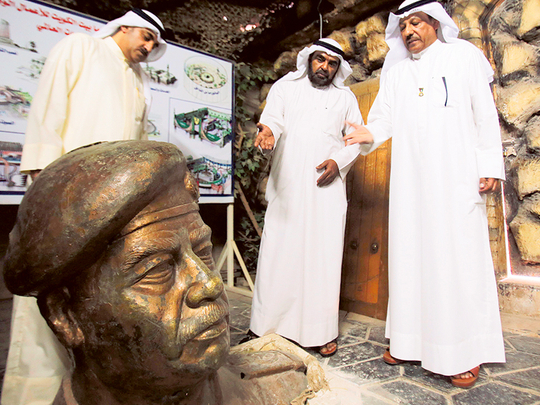
Manama: Kuwaitis are marking the anniversary of their country’s invasion by Iraqi troops on August 2, 1990 with a particular stress on social cohesion and national unity, acidly tested in June in the bombing in a Shiite mosque that left 27 people dead.
“Kuwaitis have succeeded in staying together and maintaining national unity during hard times, when their keenness on solidarity appeared much stronger than everything else, thus setting an example to follow for other nations,” a report by Kuwait News Agency (Kuna) said.
“Bonds of unity and brotherhood among the Kuwaitis were manifested in the very first moments of the August 2, 1990 Iraqi aggression. Years later, they proved to be as strong, when the Imam Sadiq Mosque bombing took place,” the report said, referring to the June 26 suicide bombing by a terror group Daesh affiliate in a Shiite mosque in the capital that left 27 worshippers dead.
All segments of the Kuwaiti society condemned the bombing and particular efforts were deployed by the various communities, including joint prayers, to overcome the attempt to divide the nation alongside sectarian faults.
“Twenty-five years after the aggression, Kuwaitis re-manifested such unity in the aftermath of the explosion that targeted Imam Sadiq Mosque in downtown Kuwait City. Spontaneously, many Kuwaitis lined up to donate blood for the injured, took part in the martyrs’ funeral and the mourning condolences at the State Grand Mosque,” the official news agency said.
Parliament Speaker Marzouq Ali Al Ganem said the plight of the Iraqi invasion of Kuwait in 1990 offered several lessons that reflected the cohesion and unity of Kuwaitis.
“History has proven that Kuwait is immune to conspirators who invariably lost their bids and were eventually smashed by the cohesion of the domestic front and compliance with legitimacy,” Al Ganem said in a press statement on the anniversary of the invasion.
“Kuwait, though it has a limited geographical area, enjoys an elevated status on the world map, thanks to Kuwaitis’ loyalty and the wisdom of its leaders, he added Kuwaitis’ patriotic and heroic actions and sacrifices for their homeland have astonished the world, Al Ganem said.
“Kuwaitis have sacrificed themselves together for the sake of the nation, and this togetherness is continuing to feed their patriotism and their allegiance to the country. That experience reflects the significance of national unity and the importance of shunning anything that might tear at the national fabric.”
Contributing his views on the anniversary of the invasion, Shaikh Faisal Al Humood Al Malek Al Sabah, the governor of Farwaniya, the most populous of Kuwait’s six governorates, said that Kuwaitis were able to win the battle against the Iraqi army thanks mainly to their high level of awareness and faith in one another.
“Twenty-five years have passed since the invasion, and one of the most significant lessons is that the unity and solidarity of the people of Kuwait are the greatest achievement that has turned our country into an unassailable bastion,” he said. “Just as they said it to the aggressors 25 years ago, Kuwaitis are saying it today to the forces of darkness that attempt to spoil their lives and to get them involved in cycles of violence. The leadership that was able to confront successfully the complexities and crises generated by the invasion has once more proven it is well capable of dealing with attempts to undermine Kuwait’s security,” he said.
In his editorial, Ahmad Al Jarallah, the editor-in-chief of Al Seyassah daily, said that Kuwait’s national unity has always come out victorious from all the crises that hit the country.
“In 1990, Kuwaitis fought an epic battle and gave an amazing example of resistance based on resolve and determination to live up to all challenges to achieve liberation,” he wrote. “Today, 25 years later, and despite all the narrow-minded political interests and power games especially during election campaigns, our social fabric remained intact. Thus, Kuwaitis turned the terrorist attack in Ramadan against Al Sadiq Mosque into yet another test in which they renewed their unity and highlighted their patriotism, drawing admiration from all over the world,” he said.
Al Jarallah said the anniversary should also be used by the Iraqis, the former invaders, to reconsider their “wrong” choices.
“The Kuwaiti suffering from the [former President] Saddam [Hussain] invasion was turned into an opportunity for unity and solidarity that highlighted that Kuwait was above all other considerations. Iraqis should draw a lesson from what happened and should listen to the voice of national reason.”
On social media, users also highlighted national unity and cohesion “during these turbulent and tumultuous times.”
However, some users said they wanted the state and civil institutions to pay greater tribute to the martyrs who sacrificed their lives for the nation by naming some streets and schools after them.
Writing on social media, Sereen said she would always recall with bitterness the day of the invasion.
“It is an infamous day in our history, but we are grateful to God and thankful to our friends that the situation was reversed seven months later” she said. “We who lived through the day do recall it very well, with its anxiety, uncertainty and fears. Like every American who remembers where exactly he or she was when their president John Kennedy was shot, we too remember where we were or what we were doing when we heard about the criminal invasion of our beloved homeland. Today, we do not want to live in history and we need to keep looking ahead and moving forward, bound by our national unity and our determination to make sure that we are Kuwaitis first and foremost, well above our personal political, social and religious orientations,” she said.











